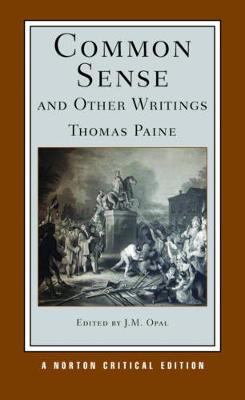Thomas Paine’s loyalties were with universal and self-evident principles rather than with a particular group or nation, and it is this dimension that informed his most important works. This Norton Critical Edition shows how Paine’s fury at the British Empire, including its injustices to South Asians and Africans, shaped his first best seller, Common Sense, and how his direct involvement with the French Revolution pushed his ideas toward a unique form of democratic radicalism. Together with his rejection of organized religion, Paine’s radicalism resulted in his being one of the most hated men in both monarchial Britain and republican America.
This volume includes J. M. Opal’s introduction, “Thomas Paine and the Revolutionary Enlightenment, 1770s–90s,” which provides essential biographical and historical details across three tumultuous decades. Paine’s most important works—from Common Sense (1776) through Agrarian Justice (1796)—are reprinted and are accompanied by explanatory annotations.
Supporting materials include a wide range of documents from the turbulent years following the publication of both Common Sense and the Declaration of Independence. These include Pennsylvania’s gradual emancipation statute of the 1780s, an ex-slave’s impassioned call for revolutionary violence against European imperialists and masters, and a British conservative’s witty rejoinder to Paine’s vision of a brave new world.
Four major interpretations of Paine’s work are provided by Nathan R. Perl-Rosenthal, Robert A. Ferguson, Gary Kates, and Gregory Claeys.
A Selected Bibliography is also included.
- ISBN10 0393978702
- ISBN13 9780393978704
- Publish Date 2 July 2012 (first published 1 November 2005)
- Publish Status Active
- Publish Country US
- Imprint WW Norton & Co
- Edition Critical edition
- Format Paperback
- Pages 352
- Language English
